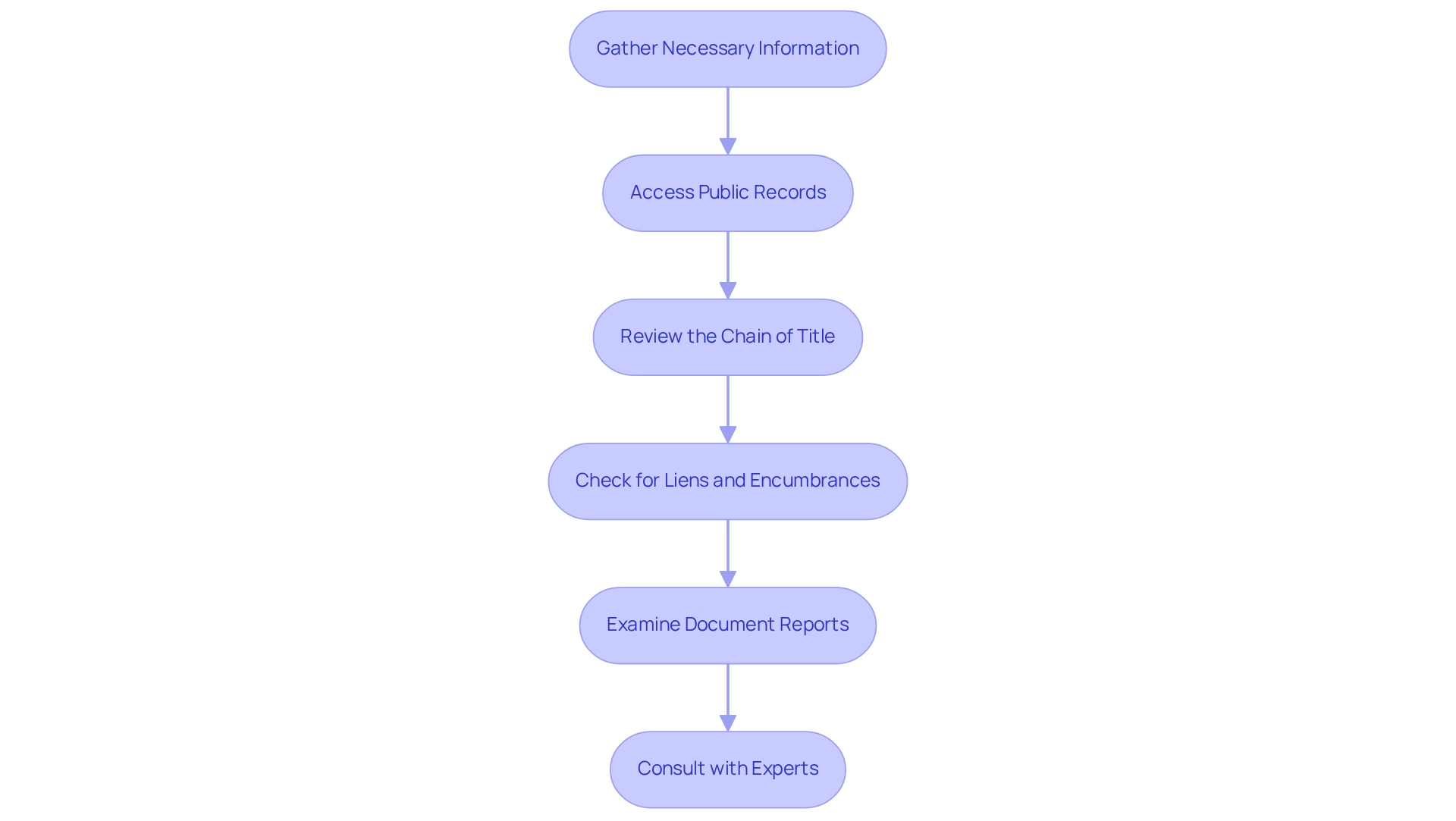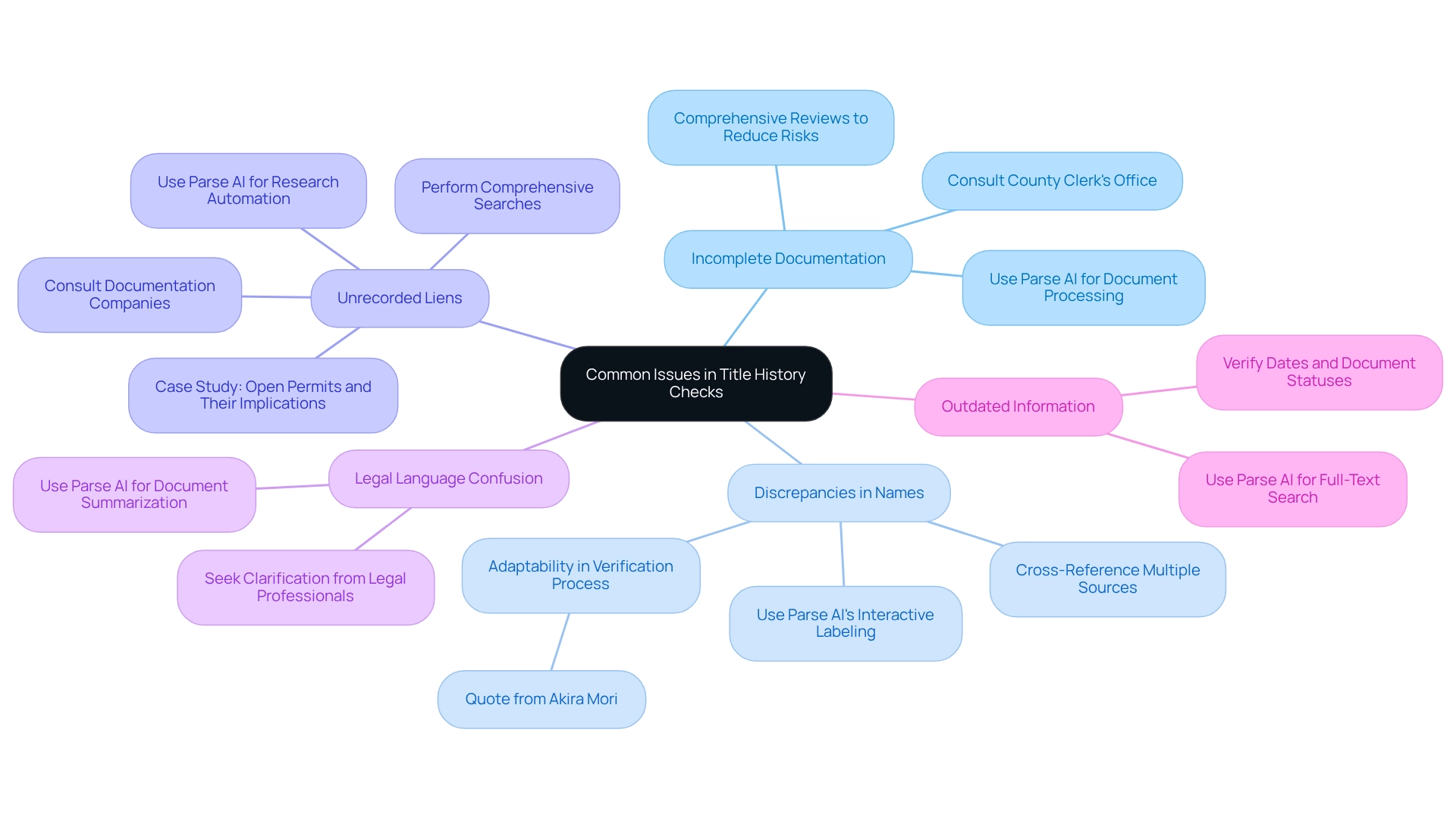Overview
The article emphasizes the critical steps and methodologies necessary for accurately checking title history in real estate transactions. It presents a systematic approach that includes:
- Gathering pertinent information
- Accessing public records
- Reviewing the chain of title
- Consulting experts
This process underscores the importance of thorough research to avert legal conflicts and protect investments. Furthermore, the article highlights the necessity of diligence in title research, addressing common challenges faced in the industry and offering robust solutions that safeguard stakeholders' interests.
Introduction
In the intricate world of real estate, understanding title history is crucial for ensuring smooth transactions and protecting investments. This chronological record of ownership reveals not only the legal claims associated with a property but also uncovers potential pitfalls, such as liens and encumbrances, that could complicate ownership. As the landscape of real estate evolves, professionals must navigate the complexities of title checks with diligence and precision.
Furthermore, by following systematic procedures and leveraging advanced technologies, they can mitigate risks and enhance the efficiency of their operations. This article delves into the importance of title history, outlines step-by-step procedures for checking it, addresses common challenges faced during the process, and highlights innovative tools available to streamline title research.
Understand Title History and Its Importance
Understanding how to check title history is crucial, as title history serves as the chronological record of ownership and legal claims related to a real estate asset, playing a pivotal role in real estate transactions for several reasons:
- Legal Ownership Verification: It confirms that the seller possesses the legal right to sell the asset, thereby protecting buyers from potential conflicts. Notably, statistics reveal that 35.4% of US marketing decision-makers cite buyer misunderstandings of value as a significant challenge in generating quality leads. This underscores the necessity of understanding how to check title history to prevent such misunderstandings.
- Identification of Liens and Encumbrances: Title history uncovers any outstanding debts or claims against the asset, which could significantly impact ownership and future transactions.
- Understanding Real Estate Rights: It clarifies easements, restrictions, or covenants that may influence how the land can be utilized, ensuring that buyers are fully informed.
- Risk Reduction: By providing a comprehensive perspective of the property's background, ownership investigation assists buyers in learning how to check title history, helping them avoid legal conflicts and safeguard their investments. Case studies, such as those from IBISWorld, emphasize how precise research methodologies contribute to reliable insights in the insurance market, reinforcing the importance of thorough history examination.
By prioritizing these aspects, real estate professionals can make informed decisions that protect their clients' interests and enhance transaction efficiency. Furthermore, as the landscape of evolves, with platforms like Sold.com connecting agents and homeowners, the significance of precise ownership verification procedures remains crucial.
Follow Step-by-Step Procedures to Check Title History
To check title history effectively, follow these steps:
- Gather Necessary Information: Begin by collecting the location's address, legal description, and details of any previous owners. This foundational data is crucial for accurate research.
- Access Public Records: Visit your local county clerk's office or utilize their online portal to access land records. Tax assessment and recorder deed data provide a foundational understanding of nearly every U.S. real estate, so focus on obtaining the deed and any associated documents, as these offer essential insights into ownership.
- Review the Chain of Title: Examine the chain of title meticulously to trace the ownership history. Ensure that each transfer of ownership is documented and legitimate, as this can reveal potential issues.
- Check for Liens and Encumbrances: Investigate any liens, mortgages, or other claims against the real estate. This information is usually located in public records and is essential for understanding any financial obligations associated with the asset.
- Examine Document Reports: If accessible, acquire a report from a firm. The case study named 'Importance of ' emphasizes that once a search of ownership is finalized, buyers obtain a preliminary report showing any issues with the property's ownership. This report is essential for buyers to determine whether to proceed with the closing process or to negotiate resolutions for any ownership issues, serving as a vital tool for decision-making.
- Consult with Experts: If you encounter discrepancies or intricate issues, consider seeking advice from a legal professional or a documentation specialist. Their expertise can provide clarity and guidance in navigating challenging situations.
As wisely stated, "Don’t be embarrassed by your failures. Learn from them and start again." By following these steps, real estate professionals can understand how to check title history for a thorough examination of property documents, minimizing risks associated with ownership disputes and enhancing the overall efficiency of the research process. Furthermore, it is important to note that despite efforts to ensure accessibility, some pages may not be fully accessible, and the website is continually improving its options and features.

Troubleshoot Common Issues in Title History Checks
When conducting title history checks, several common issues may arise that require careful attention:
- Incomplete Documentation: Missing or incomplete documents can hinder your search. In such cases, it is advisable to consult the county clerk's office for updates or additional documentation that may not be readily available. As stated by the American Land Title Association (ALTA), ensuring comprehensive reviews can reduce risks linked to incomplete documentation. Employing Parse AI's sophisticated machine learning tools, such as the example manager, can speed up document processing, assisting in recognizing and addressing gaps in files more effectively.
- Discrepancies in Names: Variations in names, such as maiden names or misspellings, can complicate the verification process. To ensure accuracy, cross-reference information with multiple sources to confirm identities. As real estate developer Akira Mori states, "In my experience, in the real-estate business, past success stories are generally not applicable to new situations. We must continually reinvent ourselves, responding to changing times with innovative new business models," highlighting the need for adaptability in addressing these discrepancies. Parse AI's interactive labeling features can assist in managing these variations effectively.
- Unrecorded Liens: Not all liens are recorded in public records, which can lead to unexpected claims. Performing comprehensive searches is crucial, and knowing how to check title history with the assistance of a documentation company can help reveal that may impact the property. A relevant case study titled "Open Permits and Their Implications" illustrates how unrecorded liens can complicate future renovations and financing, emphasizing the importance of proactive measures. With Parse AI's powerful research automation for documents, you can extract critical information from ownership records, ensuring that no hidden liens go unnoticed.
- Legal Language Confusion: The complexity of legal documents can create confusion. If you encounter terms or clauses that are difficult to understand, it is prudent to seek clarification from a legal professional to avoid misinterpretations. Parse AI's document processing capabilities can help clarify and summarize complex legal language, making it easier to navigate these documents.
- Outdated Information: Property ownership can change frequently, making it essential to access the most up-to-date documents. Always verify dates and document statuses to ensure that your information reflects the latest ownership details. Addressing outdated information is essential to ensure clarity and avoid hidden issues. Parse AI's full-text search and machine learning extraction features can streamline the process of updating and verifying ownership records.
Tackling these concerns in advance can greatly simplify the documentation examination process, ultimately safeguarding investments and enabling smoother transactions.

Utilize Technology and Resources for Efficient Title Research
To enhance the efficiency of your headline investigation, consider leveraging the following technologies and resources:
- Online Document Search Tools: Platforms such as Parse AI utilize advanced machine learning technologies to swiftly extract essential information from document records. This significantly reduces study duration while improving accuracy.
- (OCR): By employing Parse AI's OCR technology, you can digitize and analyze physical documents, making it easier to search for relevant information and enhancing overall data processing efficiency.
- [Property Investigation Software: Investing in specialized software tailored for property investigation, like the automation features offered by Parse AI, can minimize manual effort and expedite the entire process.
- Example Manager: Utilize Parse AI's example manager to efficiently annotate examples, facilitating the extraction of information from extensive sets of unstructured documents.
The integration of these technologies not only boosts efficiency but also addresses the increasing demand for skilled professionals within the tech sector. Investing in innovative solutions is crucial for understanding how to check title history and maintaining a competitive edge in an evolving landscape.
Conclusion
Understanding title history is fundamental in navigating the complexities of real estate transactions. This article emphasizes the importance of a thorough examination of title history to verify legal ownership, identify liens, and mitigate risks associated with property transactions. By following a systematic approach to checking title history, real estate professionals can ensure that they are making informed decisions that protect their clients' interests.
Addressing common issues such as incomplete records, discrepancies in names, and unrecorded liens is crucial for a successful title search. Furthermore, utilizing advanced technologies and resources, such as online title search tools and specialized software, can streamline the research process and enhance accuracy. These innovations not only improve efficiency but also equip professionals with the tools necessary to adapt to the evolving demands of the real estate market.
In conclusion, meticulous title research is not just a procedural necessity but a vital component of successful real estate transactions. By prioritizing thorough checks and embracing technological advancements, professionals can navigate the intricacies of title history with confidence, ultimately safeguarding investments and ensuring smoother transactions for all parties involved.
Frequently Asked Questions
What is title history and why is it important?
Title history is a chronological record of ownership and legal claims related to a real estate asset. It is crucial in real estate transactions as it verifies legal ownership, identifies liens and encumbrances, clarifies real estate rights, and reduces risk for buyers.
How does title history verify legal ownership?
Title history confirms that the seller has the legal right to sell the asset, protecting buyers from potential conflicts and misunderstandings regarding the property's value.
What types of issues can title history reveal?
Title history can uncover outstanding debts or claims against the asset, as well as easements, restrictions, or covenants that may affect how the property can be used.
How does understanding title history help reduce risk for buyers?
By providing a comprehensive view of the property's background, title history helps buyers avoid legal conflicts and safeguard their investments.
What role do real estate professionals play in checking title history?
Real estate professionals prioritize understanding title history to make informed decisions that protect their clients' interests and enhance transaction efficiency.
How has technology impacted the verification of ownership in real estate?
Platforms like Sold.com are evolving the landscape of real estate services, highlighting the ongoing importance of precise ownership verification procedures.




